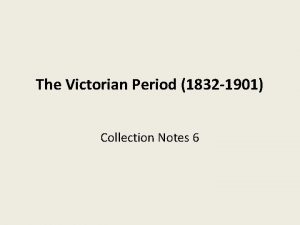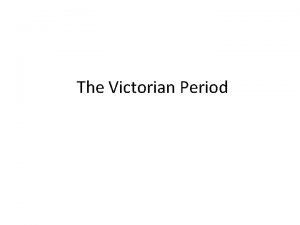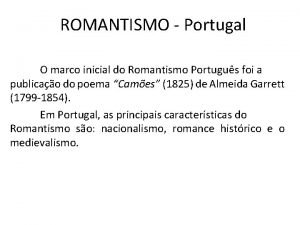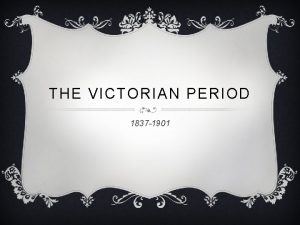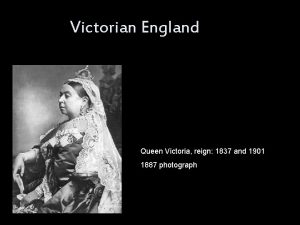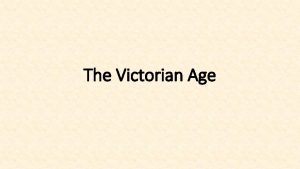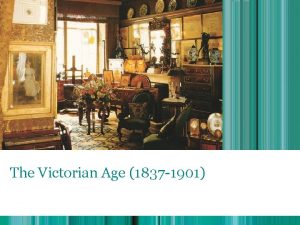THE VICTORIAN PERIOD 1837 1901 REIGN 1837 1901











- Slides: 11

THE VICTORIAN PERIOD 1837 -1901

REIGN: 1837 -1901

CULTURAL TRANSFORMATION v Huge population boom in England: 16. 8 to 30. 5 million people, partly as a result of agricultural advances and the Industrial Revolution v Hundreds of thousands of workers migrated to industrial towns (Manchester) and to London itself. v Created the downside of factory conditions: low wages, long hours, cramped quarters and working areas

IMPERIAL EXPANSION v Britain hugely expanded its colonial presence in many parts of Africa, India, the Middle East and parts of Asia. v This allowed for the increased use of English outside of Europe and opened pathways for new trade routes. v Produced long-standing animosity in colonized regions. v By the end of the 19 th-C, nearly one quarter of the land on Earth would be governed by the British Empire with more than 400 million subjects. “The sun never sets on the British Empire. ”

COLONIES v An incomplete list of British colonies and quasi-colonies in 1901 would include Australia, British Guiana (now Guyana), Brunei, Canada, Cyprus, Egypt, Gambia, the Gold Coast (Ghana), Hong Kong, British India (now Bangladesh, India, Myanmar, Pakistan, Sri Lanka), Ireland, Kenya, Malawi, the Malay States (Malaysia), Malta, Mauritius, New Zealand, Nigeria, Sierra Leone, Singapore, Somaliland (Somalia), South Africa, the Sudan, Rhodesia (Zimbabwe), and Trinidad and Tobago.

VICTORIAN MORALITY v Victorian morality is conventionally understood to be prudish and stuffy in a negative light, but also attractive and respectable. Ex. : Victorians are polite, but also repressed. v Downton Abbey, Pride and Prejudice v In Victorian English society, members of the middle-class wanted to be upwardly mobile and join the upper class gentry, thus a concern with acting “properly. ”

WOMEN v Many of the historical changes that characterized the Victorian period motivated discussion and argument about the nature and role of woman — what the Victorians called "The Woman Question. " The extension of the franchise by the Reform Bills of 1832 and 1867 stimulated discussion of women's political rights. Although women in England did not get the vote until 1918, petitions to Parliament advocating women's suffrage were introduced as early as the 1840 s. v Equally important was the agitation to allow married women to own and handle their own property, which culminated in the passing of the Married Women's Property Acts (1870– 1908).


VERY LONG VICTORIAN NOVELS v The novel replaced the poem as the most fashionable vehicle for the transmission of literature. This fundamental shift in popular taste has remained to the present day. Serial publications in magazines and journals became more and more popular, and soon these pieces were being bound and sold in their complete forms. v Dickens made full use of the serial format, and his novels betray the episodic arrangement of their original publication method. He was the first great popular novelist in England, and was the forerunner of the artistcelebrity figure which in the twentieth century would become the norm.

ESSENTIALS v Charles Dickens v Jane Austen v Lewis Carroll v The Brontes v “The Angel in the House” v Utilitarianism v Thomas Malthus

MORE ESSENTIALS v “Rule, Britannia” v Rudyard Kipling v George Eliot v Oscar Wilde v Luddites
 1837 to 1901
1837 to 1901 The victorian period (1832–1901)
The victorian period (1832–1901) Victorian period of literature
Victorian period of literature Roman floral designs
Roman floral designs English georgian floral design
English georgian floral design Victorian age 1832 to 1901
Victorian age 1832 to 1901 Ceremoniality
Ceremoniality Romantismo marco inicial
Romantismo marco inicial Florence nightingale 1837
Florence nightingale 1837 Movimento bahiense 1837
Movimento bahiense 1837 During the free banking era between 1837 and 1863
During the free banking era between 1837 and 1863 Movimento bahiense 1837
Movimento bahiense 1837





